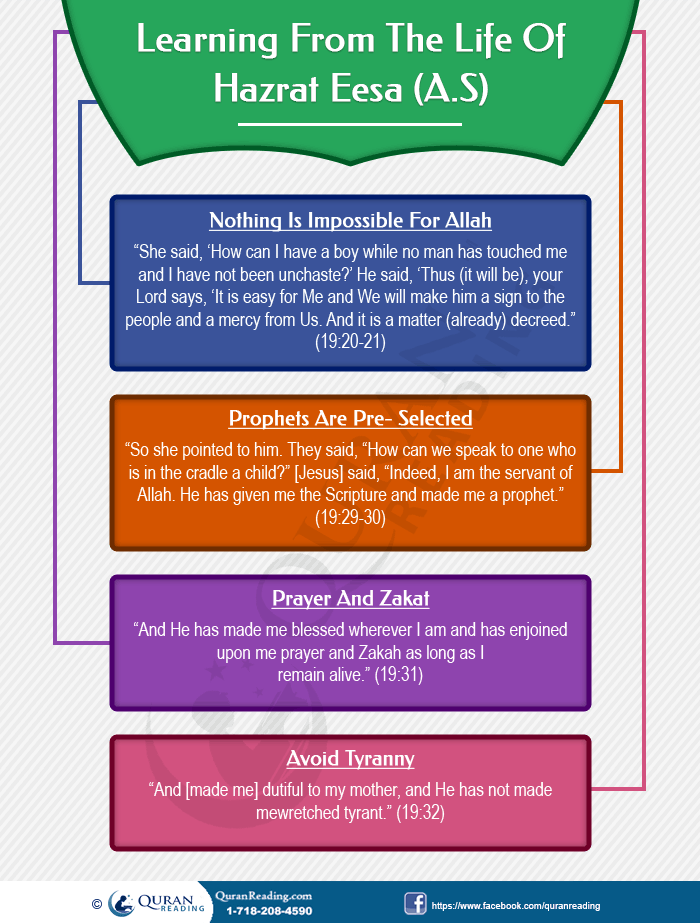
Lessons A Muslim Can Learn From The Life Of Hazrat Eesa (AS)

It is an imperative part of Islamic belief to believe in all the Prophets that Allah Almighty sent for the guidance of mankind. Whoever enters Islam by accepting its tenets, or those who are Muslims, all have to believe in the Prophets that came before Muhammad (PBUH) and spread the message of Truth and Guidance for the humanity.
One of the renowned Prophets in this regard is Prophet Eesa or Jesus (AS). He is the bringer of Christianity that is one of the major religions of the world. Muslims believe in Hazrat Eesa (AS) as the righteous Prophet of Allah Almighty who spread His message. In Quran there are several mentions of Prophet Eesa (AS) in several contexts all serving as a lesson for Muslims.

The lines below consider the major verses of Surah Maryam that are specific to Hazrat Eesa (AS) and the events that took place in his life. The ayahs give valuable lessons to a Muslim, which everyone should try to extract from them.
Nothing Is Impossible For Allah:
Perhaps the biggest lesson that the life of Hazrat Eesa (AS) gives to a Muslim is the fact that for Allah there is nothing impossible. He can do whatever He wants and the way He wants. The example of it can be seen in the form of the birth of Hazrat Eesa (AS). He was born without a father and his birth stands as one of the greatest miracles in the human history. When Gabriel came to Hazrat Maryam (AS) who was the mother of Hazrat Eesa (AS) and informed her about the birth of Eesa (AS), her response is mentioned in the following way in Quran:
“She said, ‘How can I have a boy while no man has touched me and I have not been unchaste?’ He said, ‘Thus (it will be), your Lord says, ‘It is easy for Me and We will make him a sign to the people and a mercy from Us. And it is a matter (already) decreed.” (19:20-21)
The ayahs make it clear that the birth of Hazrat Eesa (AS) without a father is undoubtedly the will of Allah and there is nothing that stands impossible in front of His will. For a Muslim, the birth of Hazrat Eesa (AS) besides being a miracle is a sign that tells them that those who rely on Allah Almighty, they can surely witness miracles because Allah can do whatever He wants and making miracles happen is an easy thing for Him. Thus, from the birth of Hazrat Eesa (AS) Muslims should learn to rely on Allah and expect whatever they want from Him, as He is the only One Who can give anything to a being.
Prophets Are Pre- Selected:
Prophethood was an honor that Allah bestowed upon the selected people and it was not something which one could earn by struggle and hardship. Allah had predestined the Prophets and all the Prophets became Prophet in their due time, the process of which ended with the final Prophet Muhammad (PBUH). Hazrat Eesa (AS) spoke to his people whilst he was in cradle about which Quran mentions:
“So she pointed to him. They said, “How can we speak to one who is in the cradle a child?” [Jesus] said, “Indeed, I am the servant of Allah. He has given me the Scripture and made me a prophet.” (19:29-30)
Thus, the conception that being a Prophet had something to do with a human struggling for it and striving to earn the honor of being a Prophet is wrong, rather it is an honor that Allah Almighty bestowed upon people whom He willed. The proclamation of Hazrat Eesa (AS) about his prophethood in the cradle is an evident example of it and a Muslim should learn from it that the bestowing of honor is a blessing of Allah and there are some on whom He bestows this honor by predestining it.
Prayer And Zakat:
It is also a conception among Muslims that the offering of Salat daily and Zakat is something that is specific to Islam and the earlier nations before Muslims had no such obligation. This is a misconception and the earlier prophets that came, they also came with the message of Oneness of Allah and prayer and charity. The same message can be learned from the life of Hazrat Eesa (AS) as well, where when he spoke to his people he said:
“And He has made me blessed wherever I am and has enjoined upon me prayer and Zakah as long as I remain alive.” (19:31)
From the message of Hazrat Eesa (AS) it is clear that offering Salah and Zakah is an imperative message from Allah that all the Prophets brought and thus a Muslim should not take it lightly. Moreover, the other thing that is prominent in the ayah is ‘as long as I remain alive’. Therefore, offering Salah and Zakat is not specific to a particular time in life, rather it is what a Muslim ought to do when he or she becomes eligible and should continue on doing so as long as he or she remains alive.
Avoid Tyranny:
Speaking to his people, Hazrat Eesa (AS) said:
Hazrat Eesa (AS) was one of the most docile person to have lived on the face of this earth, however, his love for peace does not mean that he let tyranny take its rule. It was against the tyranny of that time that he spread the message of truth, therefore, despite his docile and peaceful nature, he neither was a tyrant nor did he supported tyranny. Thus, Muslims should refrain from any sort of tyranny, and when they time comes they should stand against tyranny as well.
In a nutshell, belief in the Prophethood of Hazrat Eesa (AS) is pivotal to the faith of a Muslim. In addition to simply believing in him as a Prophet, Muslims must also learn from his life and try adopting whatever he did in life in their daily lives, so that they could also move forward on the path of righteousness and receive blessings and reward from Allah in this and the world to come.




